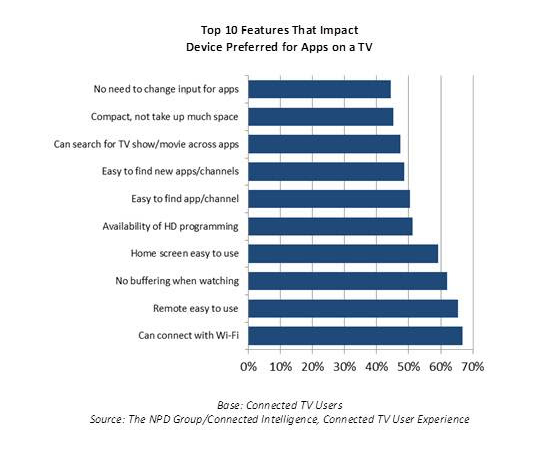Despite the increasing popularity of streaming set-top boxes, gaming consoles, and so-called "smart TVs," just 42 million of America's 115 million households have televisions that can display content from the Internet, suggesting significant room for growth for Apple TV.
The seemingly low figure released Thursday nevertheless represents a 17 percent increase over the numbers from one year ago, when only 36 million households had internet-connected devices in their living room. Market research firm NPD arrived at the totals after surveying 5,000 individuals as part of their most recent Connected Home Report.
"Consumers want devices that can deliver high-quality content to their TVs," NPD executive John Buffone said in a release. "The increase in Connected TV and streaming media player penetration is proof that consumers are investing in solutions that can provide app-related content in the simplest, most effective way."
Notably, the number of streaming media players surpassed connected Blu-ray disc players in living rooms for the first time. That surge in adoption may be good news for Apple as the company is thought to be preparing a major update to its own set-top streamer, the Apple TV.
Somewhat unsurprisingly, connectivity and user experience were at the top of the list when respondents were asked what was most important to them in a connected device, as 67 percent said that the ability to connect to the internet over Wi-Fi was their biggest concern. That was followed by desire for an easy-to-use remote control, minimal content buffering, an easily navigable home screen, and the availability of high-definition programming.
 AppleInsider Staff
AppleInsider Staff








 Wesley Hilliard
Wesley Hilliard
 Malcolm Owen
Malcolm Owen
 Andrew Orr
Andrew Orr
 William Gallagher
William Gallagher
 Sponsored Content
Sponsored Content
 Christine McKee
Christine McKee

 Thomas Sibilly
Thomas Sibilly






32 Comments
It all comes down to trust. When LG provided its customers the ability to opt-out of having their usage data sent to LG, LG chose to ignore the opt-outs. There really is no reason whatsoever for LG or any other company to charge for a television then invade the privacy of customers who opt-out of being tracked.
And I'll wager that a small percentage of even that third.even have the connection hooked up. I know that if my tv's IP connection was via the set's built in software, I'd never use it.
[quote name="leavingthebigG" url="/t/179702/npd-only-one-third-of-us-households-have-internet-connected-televisions#post_2534287"]It all comes down to trust. When LG provided its customers the ability to opt-out of having their usage data sent to LG, LG chose to ignore the opt-outs. There really is no reason whatsoever for LG or any other company to charge for a television then invade the privacy of customers who opt-out of being tracked. [/quote] [B]Personally[/B] I think that remaining two-thirds comes down to need vs. cost for the most part. Trust has little to do with it.
I don't even have a TV. My laptop removed the need for a TV a decade ago. Better resolution, and if you sit close enough you can't tell the difference.
I have two "smart" TV's (one's a Sony, the other a Samsung), and I will never connect either one. The reasons are simple:
So, no thank you. I'll stick to AppleTV, or companies that understand how to make a networking product.